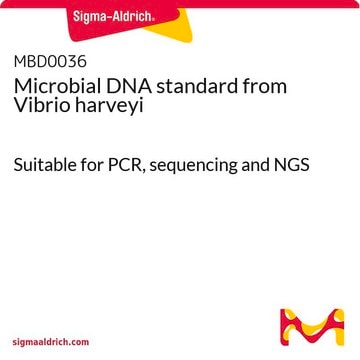MBD0019
Microbial DNA standard from Burkholderia pyrrocinia
Suitable for PCR, sequencing and NGS, 10 ng/μL
Anmeldenzur Ansicht organisationsspezifischer und vertraglich vereinbarter Preise
Alle Fotos(1)
About This Item
UNSPSC-Code:
41105500
NACRES:
NA.24
Empfohlene Produkte
Qualitätsniveau
Form
liquid
Konzentration
10 ng/μL
Methode(n)
DNA extraction: suitable
DNA sequencing: suitable
PCR: suitable
Versandbedingung
ambient
Lagertemp.
−20°C
Verwandte Kategorien
Allgemeine Beschreibung
Standardization of sample analysis is currently needed in microbiome genomics research workflow. Lack of standardization can lead to biases and errors in common processes during sample preparation and analysis such as sample amplification, sequencing and bioinformatics analyses. Burkholderia pyrrocinia genomic DNA microbial standard can serve as standard for benchmarking the performance along the workflow of microbiomics or meta-genomics analyses and as a tool to increase reproducibility and allow comparison of results obtained by different labs.
Burkholderia cepacia complex (Bcc) species are a group of Gram-negative opportunistic pathogens that chronically infect the airways of cystic fibrosis patients, but they can also infect patients with various types of immunosuppressive disorders. Bcc members are multidrug resistant bacteria that have the ability to persist in the infected host and also elicit robust inflammatory responses. It currently includes 20 closely related, but distinct, species of bacteria, with a wide environmental distribution.
B. cepacia has an unusually large genetic make up with a total DNA content greater than 7 megabases and as many as three megabase-sized replicons. This large genetic make up accounts for its microbiological versatility. Advances in the taxonomy of Bcc revealed that it comprises at least nine genetically closely related species, including B. pyrrocinia, which can be differentiated on the basis of molecular and biochemical tests.
Read here how to use our standards to ensure data integrity for your microbiome research.
Burkholderia cepacia complex (Bcc) species are a group of Gram-negative opportunistic pathogens that chronically infect the airways of cystic fibrosis patients, but they can also infect patients with various types of immunosuppressive disorders. Bcc members are multidrug resistant bacteria that have the ability to persist in the infected host and also elicit robust inflammatory responses. It currently includes 20 closely related, but distinct, species of bacteria, with a wide environmental distribution.
B. cepacia has an unusually large genetic make up with a total DNA content greater than 7 megabases and as many as three megabase-sized replicons. This large genetic make up accounts for its microbiological versatility. Advances in the taxonomy of Bcc revealed that it comprises at least nine genetically closely related species, including B. pyrrocinia, which can be differentiated on the basis of molecular and biochemical tests.
Read here how to use our standards to ensure data integrity for your microbiome research.
Anwendung
The genomic DNA is provided at >=10 ng/μL concentration in TE buffer pH 8.0. It is recommended to avoid freeze thaw cycles of this product.
Suitable for Quantitative standard for PCR, Sequencing and NGS
Suitable for Quantitative standard for PCR, Sequencing and NGS
Leistungsmerkmale und Vorteile
- Individual microbial standard for microbiomics and meta-genomics workflow
- Suitable standard for PCR, sequencing and NGS
- Improve Bioinformatics analyses
- Increases reproducibility
- Compare results lab to lab
Physikalische Form
Liquid - The genomic DNA is provided at >=10 ng/μL concentration in TE buffer pH 8.0
Lagerklassenschlüssel
12 - Non Combustible Liquids
WGK
WGK 1
Flammpunkt (°F)
Not applicable
Flammpunkt (°C)
Not applicable
Analysenzertifikate (COA)
Suchen Sie nach Analysenzertifikate (COA), indem Sie die Lot-/Chargennummer des Produkts eingeben. Lot- und Chargennummern sind auf dem Produktetikett hinter den Wörtern ‘Lot’ oder ‘Batch’ (Lot oder Charge) zu finden.
Besitzen Sie dieses Produkt bereits?
In der Dokumentenbibliothek finden Sie die Dokumentation zu den Produkten, die Sie kürzlich erworben haben.
Unser Team von Wissenschaftlern verfügt über Erfahrung in allen Forschungsbereichen einschließlich Life Science, Materialwissenschaften, chemischer Synthese, Chromatographie, Analytik und vielen mehr..
Setzen Sie sich mit dem technischen Dienst in Verbindung.








